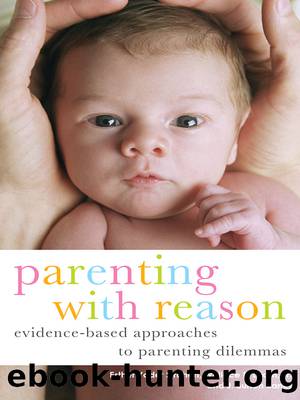Parenting with Reason by unknow

Author:unknow
Language: eng
Format: epub
Tags: Behavioral Sciences
Publisher: Taylor & Francis Group
Published: 2009-10-26T00:00:00+00:00
Beyond behaviours
All professional behaviour analysts, like Supernanny, and indeed all professional trainers of any sort, incorporate these foundational concepts into their efforts. These techniques are not magic, and they are not proprietary. They are simply basic behavioural principles at anyoneâs disposal. Besides behavioural professionals being more experienced than regular parents, there is probably only one major difference between the two groups: professionals know that behaviour analytic techniques work, indeed they make their living off them; while parents may feel uncertain or even sceptical about the efficacy of these techniques. For parents who donât feel confident in being able to use these techniques, there are many additional resources available from the internet, and popular press publications such as Glenn Lathamâs book The power of positive parenting: A wonderful way to raise children, and former president of the American Psychological Association, Alan Kazdinâs book, The Kazdin method for parenting the defiant child: With no pills, no therapy, no contest of wills.
We acknowledge that our coverage in this chapter has been one-sided, with an exclusive focus on the techniques used in applied behaviour analysis. Our one-sidedness has been intentional, and only reflects our desire to familiarize parents with a set of basic disciplinary principles that are easy to use in the comfort of their own homes, with little formal training, and that are well known to work and to work well. Applied behaviour analysis is not only used in the successful socialization of typically developing children worldwide, but it is also one of the most successful techniques for managing children with severe mental or behavioural disabilities, including children with Downâs syndrome and autism.
But there is obviously a lot more to children than just their behaviours, and many other systems of behaviour management have arisen which take into account childrenâs thoughts, beliefs, and feelings. Some of these systems have been specially developed for working with children with severe behavioural problems, including those with âoppositional defiant disorderâ or âconduct disorderâ. In a fairly comprehensive review article, Sheila Eyberg and her colleagues itemize several of these systems, describing them collectively as âevidence-based psychosocial treatments for children and adolescents with disruptive behaviourâ. Targeted primarily at children whose behaviours are so severely out of line with expectations that they run the risk of not achieving normal socialization, these systems blend many aspects of applied behaviour analysis with approaches that focus on how children think and how children form relationships with others.
It is beyond the scope of this chapter to consider all sixteen treatments for disruptive behaviour disorders, but looking briefly at a couple of them may help interested parents understand how applied behaviour analysis techniques can be blended with other approaches. In anger control training, for example, children with disruptive behaviour problems meet once per week during the school day in groups of about six children. In the group, children read short stories about social encounters, and discuss the kinds of social cues given off by characters in the story, and also possible motives of the characters. Children
Download
This site does not store any files on its server. We only index and link to content provided by other sites. Please contact the content providers to delete copyright contents if any and email us, we'll remove relevant links or contents immediately.
Jehovah's Witnesses and the Real Truth by Winters Joseph(366)
The Missional Quest by Ford Lance;Brisco Brad;Stetzer Ed;(85)
Parenting with Reason by unknow(64)
Ushering In His Presence by Olanrewaju (Lanre) Asiru(61)
Making Neighborhoods Whole by Gordon Wayne;Perkins John M.;Claiborne Shane;(57)
Rooting for Rivals by Peter Greer(56)
Santaâs Secret Shopper by Vivianna Waters(53)
PST by yck498q1(48)
BY A.H. Church, Church A.H. - Food by 1882(44)
Topology Change and Context Dependence by Unknown(43)
Microsoft Word - 12-11 Forefathers-2-Sundays b4 Nativity.doc by Administrator(39)
Influence of ammonia on propane oxidation over a gallium-antimony oxide catalyst by Unknown(32)
Impurity effect on Kramer-Pesch core shrinkage in <Emphasis Type="Italic">s <Emphasis>-wave vortex and chiral <Emphasis Type="Italic">p <Emphasis>-wave vortex by Unknown(22)
